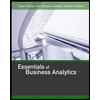
Corporate Finance (The Mcgraw-hill/Irwin Series in Finance, Insurance, and Real Estate)
11th Edition
ISBN: 9780077861759
Author: Stephen A. Ross Franco Modigliani Professor of Financial Economics Professor, Randolph W Westerfield Robert R. Dockson Deans Chair in Bus. Admin., Jeffrey Jaffe, Bradford D Jordan Professor
Publisher: McGraw-Hill Education
expand_more
expand_more
format_list_bulleted
Question
Chapter 4, Problem 1MC
Summary Introduction
Case summary:
B has completed his undergraduate degree in finance before six years. His aim is to become an investment banker, though he is satisfied with the present job. Person B was searching for the best college to do MBA program, which he thinks would assist in achieving his aim. He was looking for University W and College M. The details of Person B's current job and his course details are provided.
Characters in the case:
- Person B
- University W
- College M
- Company DL
- College R
- College M
- School B
Adequate information:
- Person B is not allowed to work anywhere until the completion of MBA program.
- The salaries are not paid for the internship course.
To determine: The age factor that affects Person B’s decision to pursue an MBA
Expert Solution & Answer
Trending nowThis is a popular solution!

Students have asked these similar questions
1
2
Fast
Clipboard
F17
DITECTIONS.
BIU-
Font
B
X
C
A.
fx
=C17+D17-E17
E
F
Merge & Center -
4
$ - % 9
4.0.00
Conditional Format as
.00 9.0
Alignment
Number
Cell
Formatting - Table -
Table Styles -
Styles
Insert Delete Fe
Cells
H
Mario Armando Perez is the kitchen manager at the Asahi Sushi House. Mario's restaurant offers five popular types of sushi roll. Mario keeps
4 careful records of the number of each roll type sold, from which he computes each item's popularity index. For March 1, Mario estimates 150
5 guests will be served.
6
8
9
10
11
04
At the end of the day, Mario also records his actual number sold in order to calculate his carryover amount for the next day.
7 Based on his experience, and to ensure he does not run out of any item, Mario would like to have extra servings (planned overage) of selected
menu items available for sale. Using planned overage, the popularity index of his menu items, and his prior day's carryover information, help
Mario determine the amount of new…
Your company is planning to borrow $2.75 million on a 5-year, 16%, annual payment, fully amortized term loan.
The data has been collected in the Microsoft Excel Online file below. Open the spreadsheet and perform the required analysis to answer the question below.
Amortization
Loan amount
$2,750,000
Term in years
5
Annual coupon rate
16.00%
Calculation of Loan Payment
Formula
Loan payment =
#N/A
Loan Amortization Schedule
Year
Beginning Balance
Payment
Interest
Principal
Ending Balance
1
2
3
4
5
Formulas
Loan Amortization Schedule
Year
Beginning Balance
Payment
Interest
Principal
Ending Balance
1
#N/A
#N/A
#N/A
#N/A
#N/A
2
#N/A
#N/A
#N/A
#N/A
#N/A
3
#N/A…
Your father is 50 years old and will retire in 10 years. He expects to live for 25 years after he retires, until he is 85. He wants a fixed retirement income that has the same purchasing power at the time he retires as $45,000 has today. (The real value of his retirement income will decline annually after he retires.) His retirement income will begin the day he retires, 10 years from today, at which time he will receive 24 additional annual payments. Annual inflation is expected to be 5%. He currently has $180,000 saved, and he expects to earn 8% annually on his savings. The data has been collected in the Microsoft Excel Online file below. Open the spreadsheet and perform the required analysis to answer the question below.
Required annuity payments
Retirement income today
$45,000
Years to retirement
10
Years of retirement
25
Inflation rate
5.00%…
Chapter 4 Solutions
Corporate Finance (The Mcgraw-hill/Irwin Series in Finance, Insurance, and Real Estate)
Ch. 4 - Prob. 1CQCh. 4 - Prob. 2CQCh. 4 - Prob. 3CQCh. 4 - Prob. 4CQCh. 4 - Time Value On subsidized Stafford loans, a common...Ch. 4 - Prob. 6CQCh. 4 - Prob. 7CQCh. 4 - Prob. 8CQCh. 4 - Prob. 9CQCh. 4 - Prob. 10CQ
Ch. 4 - Simple Interest versus Compound Interest First...Ch. 4 - Prob. 2QPCh. 4 - Prob. 3QPCh. 4 - Prob. 4QPCh. 4 - Prob. 5QPCh. 4 - Prob. 6QPCh. 4 - Calculating Present Values Imprudential, Inc., has...Ch. 4 - Calculating Rates of Return Although appealing to...Ch. 4 - Perpetuities An investor purchasing a British...Ch. 4 - Prob. 10QPCh. 4 - Prob. 11QPCh. 4 - Prob. 12QPCh. 4 - Calculating Annuity Present Value An investment...Ch. 4 - Calculating Perpetuity Values The Perpetual Life...Ch. 4 - Calculating EAR Find the EAR in each of the...Ch. 4 - Calculating APR Find the APR, in each of the...Ch. 4 - Calculating EAR First National Bank charges 10.3...Ch. 4 - Interest Rates Well-known financial writer Andrew...Ch. 4 - Calculating Number of Periods One of your...Ch. 4 - Prob. 20QPCh. 4 - Prob. 21QPCh. 4 - Simple Interest versus Compound Interest First...Ch. 4 - Calculating Annuities You are planning to save for...Ch. 4 - Prob. 24QPCh. 4 - Prob. 25QPCh. 4 - Prob. 26QPCh. 4 - Prob. 27QPCh. 4 - Annuity Present Values What is the present value...Ch. 4 - Annuity Present Values What is the value today of...Ch. 4 - Balloon Payments Audrey Sanborn has just arranged...Ch. 4 - Prob. 31QPCh. 4 - Prob. 32QPCh. 4 - Growing Annuity Southern California Publishing...Ch. 4 - Growing Annuity Your job pays you only once a year...Ch. 4 - Prob. 35QPCh. 4 - Prob. 36QPCh. 4 - Prob. 37QPCh. 4 - Calculating Loan Payments You need a 30-year,...Ch. 4 - Prob. 39QPCh. 4 - Calculating Present Values You just won the TVM...Ch. 4 - Prob. 41QPCh. 4 - Prob. 42QPCh. 4 - Prob. 43QPCh. 4 - Prob. 44QPCh. 4 - Prob. 45QPCh. 4 - Prob. 46QPCh. 4 - Prob. 47QPCh. 4 - Prob. 48QPCh. 4 - Prob. 49QPCh. 4 - Prob. 50QPCh. 4 - Calculating Annuities Due You want to lease a set...Ch. 4 - Prob. 52QPCh. 4 - Prob. 53QPCh. 4 - Prob. 54QPCh. 4 - Prob. 55QPCh. 4 - Prob. 56QPCh. 4 - Prob. 57QPCh. 4 - Prob. 58QPCh. 4 - Prob. 59QPCh. 4 - Prob. 60QPCh. 4 - Prob. 61QPCh. 4 - Prob. 62QPCh. 4 - Prob. 63QPCh. 4 - Prob. 64QPCh. 4 - Calculating the Number of Periods Your Christmas...Ch. 4 - Prob. 66QPCh. 4 - Prob. 67QPCh. 4 - Prob. 68QPCh. 4 - Prob. 69QPCh. 4 - Perpetual Cash Flows What is the value of an...Ch. 4 - Prob. 71QPCh. 4 - Prob. 72QPCh. 4 - Prob. 73QPCh. 4 - Prob. 74QPCh. 4 - Rule or 69.3 A corollary to the Rule of 72 is the...Ch. 4 - Prob. 1MCCh. 4 - Prob. 2MCCh. 4 - Prob. 3MCCh. 4 - Prob. 4MCCh. 4 - Prob. 5MCCh. 4 - Prob. 6MC
Knowledge Booster
Similar questions
- Answer in step by step with explanation. Don't use Ai and chatgpt.arrow_forwardArticle: Current Bank Problem Statement The general problem to be surveyed is that leaders lack an understanding of how to address job demands, resulting in an increase in voluntary termination, counterproductive workplace outcomes, and a loss of customers. Bank leaders discovered from customer surveys that customers are closing accounts because their rates are not competitive with area credit unions. Job demands such as a heavy workload interfered with employee performance, leading to decreased job performance. Healthcare employees who felt the organization’s benefits were not competitive were more likely to quit without notice, resulting in retention issues for the organization. Information technology leaders who provide job resources to offset job demand have seen an increase in (a) new accounts, (b) employee productivity, (c) positive workplace culture, and (d) employee retention. The specific problem to be addressed is that IT technology leaders in the information technology…arrow_forwardHow to rewrite the problem statement, correcting the identified errors of the Business Problem Information and the current Bank Problem Statement (for the discussion: Evaluating a Problem Statement)arrow_forward
- Don't used hand raiting and don't used Ai solutionarrow_forward3 years ago, you invested $9,200. In 3 years, you expect to have $14,167. If you expect to earn the same annual return after 3 years from today as the annual return implied from the past and expected values given in the problem, then in how many years from today do you expect to have $28,798?arrow_forwardPlease Don't use Ai solutionarrow_forward
- Ends Feb 2 Discuss and explain in detail the "Purpose of Financial Analysis" as well as the two main way we use Financial Ratios to do this.arrow_forwardWhat is the key arguments of the supporters of the EITC? Explain.arrow_forwardWhat is the requirements to be eligible to receive the EITC? Explain.arrow_forward
arrow_back_ios
SEE MORE QUESTIONS
arrow_forward_ios
Recommended textbooks for you
 Essentials of Business Analytics (MindTap Course ...StatisticsISBN:9781305627734Author:Jeffrey D. Camm, James J. Cochran, Michael J. Fry, Jeffrey W. Ohlmann, David R. AndersonPublisher:Cengage Learning
Essentials of Business Analytics (MindTap Course ...StatisticsISBN:9781305627734Author:Jeffrey D. Camm, James J. Cochran, Michael J. Fry, Jeffrey W. Ohlmann, David R. AndersonPublisher:Cengage Learning Intermediate Financial Management (MindTap Course...FinanceISBN:9781337395083Author:Eugene F. Brigham, Phillip R. DavesPublisher:Cengage Learning
Intermediate Financial Management (MindTap Course...FinanceISBN:9781337395083Author:Eugene F. Brigham, Phillip R. DavesPublisher:Cengage Learning


Essentials of Business Analytics (MindTap Course ...
Statistics
ISBN:9781305627734
Author:Jeffrey D. Camm, James J. Cochran, Michael J. Fry, Jeffrey W. Ohlmann, David R. Anderson
Publisher:Cengage Learning


Intermediate Financial Management (MindTap Course...
Finance
ISBN:9781337395083
Author:Eugene F. Brigham, Phillip R. Daves
Publisher:Cengage Learning